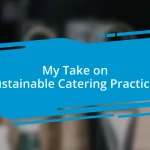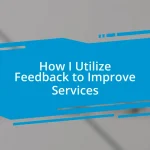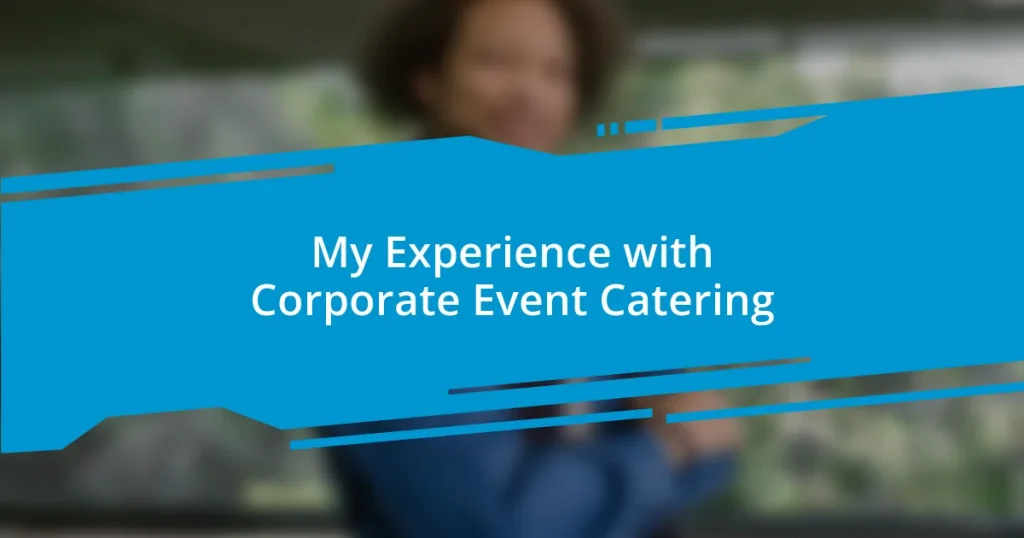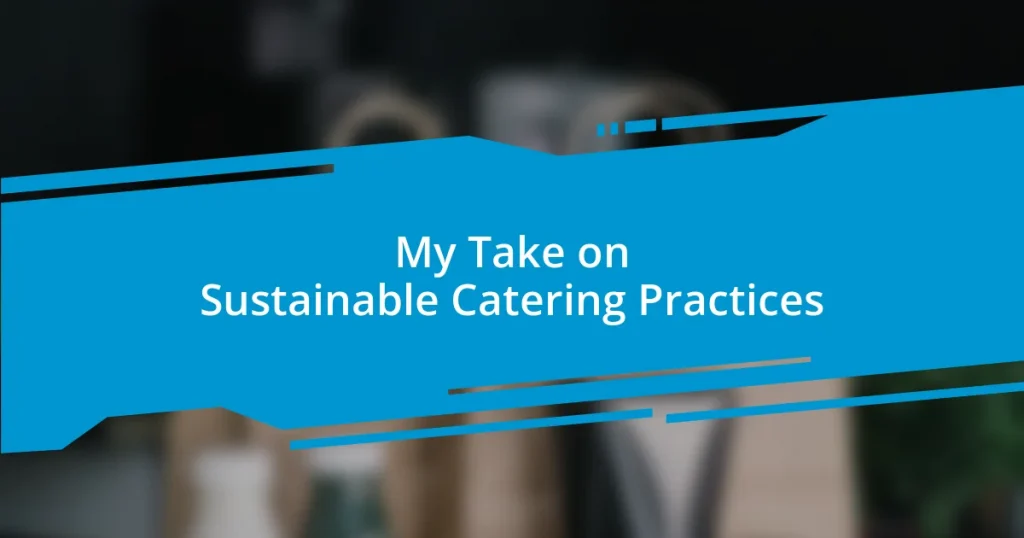Key takeaways:
- Successful corporate event catering requires strategic menu planning that aligns with the event’s goals and audience preferences, elevating the overall experience.
- Communication and coordination between caterers and event organizers are essential to avoid logistical issues and ensure a seamless flow during the event.
- Collecting and incorporating post-event feedback can lead to continuous improvement in catering services and strengthen relationships with clients.
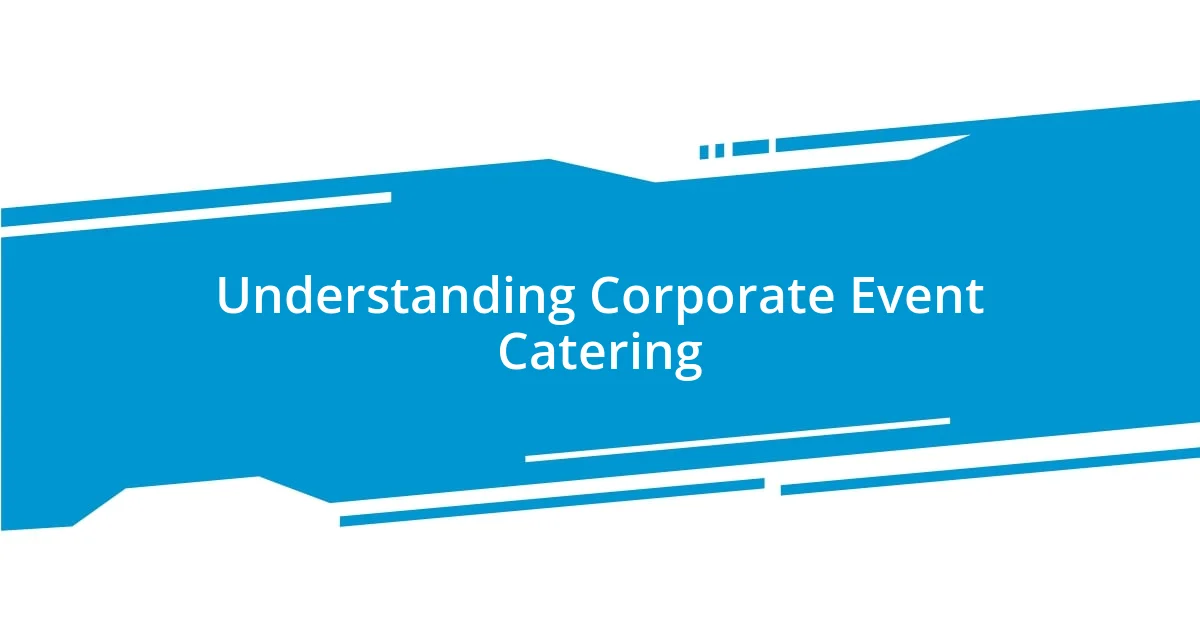
Understanding Corporate Event Catering
Corporate event catering can be a nuanced world, often underestimated in its importance. I remember attending a high-stakes product launch where the food was as memorable as the presentation itself; the choice of flavors sparked conversations and seemed to elevate the entire event. It made me wonder, how often do we overlook the impact of cuisine on discussions, networking, and even brand perception?
I’ve learned that successful catering goes beyond just filling plates. It involves strategic menu planning that aligns with the event’s goals and audience preferences. For instance, at a recent seminar, the decision to serve locally sourced, seasonal dishes not only delighted the attendees but also reinforced the company’s commitment to sustainability. It’s fascinating to see how such choices resonate with participants on a deeper emotional level, isn’t it?
Understanding corporate event catering also means recognizing its logistical challenges. A couple of years ago, I witnessed an event where the timing of food service clashed with a keynote speech; the distraction was palpable. This experience taught me that seamless coordination between the caterer and event organizers is essential for creating a harmonious flow—something I now prioritize whenever I’m involved in planning.
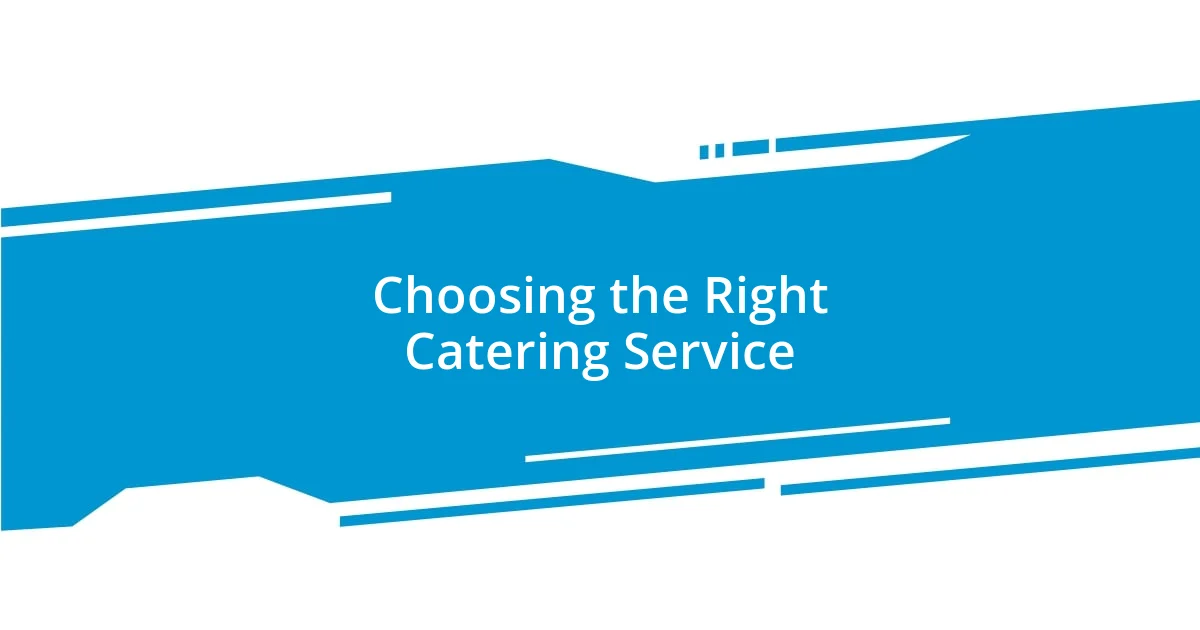
Choosing the Right Catering Service
When it comes to choosing the right catering service, I’ve seen how vital it is to align choices with your event’s theme and goals. I remember a networking dinner I attended where the caterer crafted a menu that directly reflected the tech industry’s cutting-edge nature. The modern presentation and innovative flavors not only impressed the guests but also sparked conversations that flowed well into the night. It’s moments like this that remind me that catering can be the heartbeat of an event, setting the tone before the presentations even begin.
Here are some key factors to consider when selecting a catering service:
- Experience with Similar Events: Look for a caterer who has successfully managed events similar to yours. Their familiarity can enhance the overall experience.
- Menu Flexibility: Ensure they can accommodate various dietary restrictions. This shows attentiveness to guest satisfaction.
- Tasting Sessions: Participate in tastings! Experiencing the food firsthand can help you visualize how it will fit into your event.
- Staff Professionalism: Engaging and professional staff can elevate the service experience significantly, making your guests feel valued.
- Reputation and Reviews: Explore online reviews and ask for references. A reputable caterer will have positive feedback to support their claims.
These insights can guide you in making a choice that resonates with not just logistics, but also the experience you’ll create for your attendees.
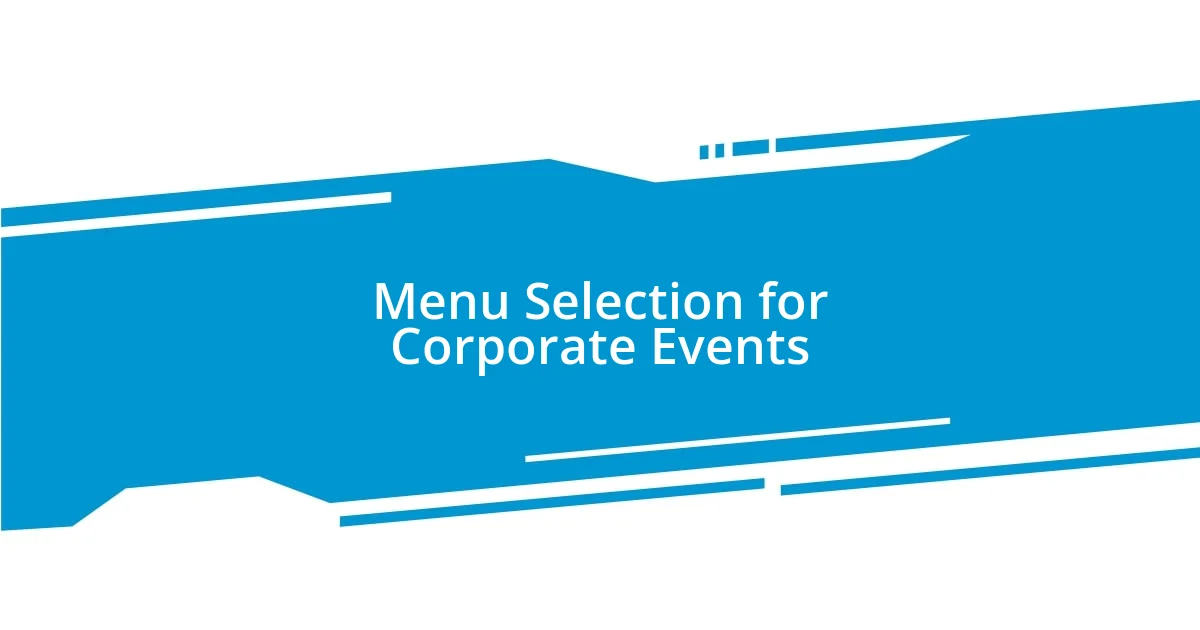
Menu Selection for Corporate Events
Menu selection for corporate events is a pivotal aspect that can significantly shape the overall atmosphere. I recall a corporate retreat where the menu featured an eclectic mix of international cuisines. This not only delighted the diverse group of attendees but also encouraged them to share their culinary stories, fostering connections beyond the usual business chatter. When the food sparks joy, it creates a relaxed environment conducive to discussions that matter.
The key to effective menu selection lies in understanding your audience. I remember planning a product launch where we decided on a brunch layout, featuring both savory and sweet options. The variety catered to different preferences, ensuring every guest felt included. It was remarkable to see how a well-thought-out menu could stimulate interaction, with attendees moving from table to table, sharing their favorites. Have you ever noticed how easily conversations flow when guests are excited about what they’re eating?
In my experience, incorporating local elements into the menu can enhance the corporate event’s authenticity. A few months ago, I attended a conference where the meal featured ingredients sourced from nearby farms. It was not just a meal; it was a narrative that connected the attendees to the community. By choosing locally sourced ingredients, the event not only supported local businesses but also showed a commitment to sustainability. These thoughtful choices make events memorable and can leave a lasting impact on your brand image.
| Menu Features | Events |
|---|---|
| International Cuisines | Corporate Retreat |
| Brunch Menu | Product Launch |
| Locally Sourced Ingredients | Conferences |
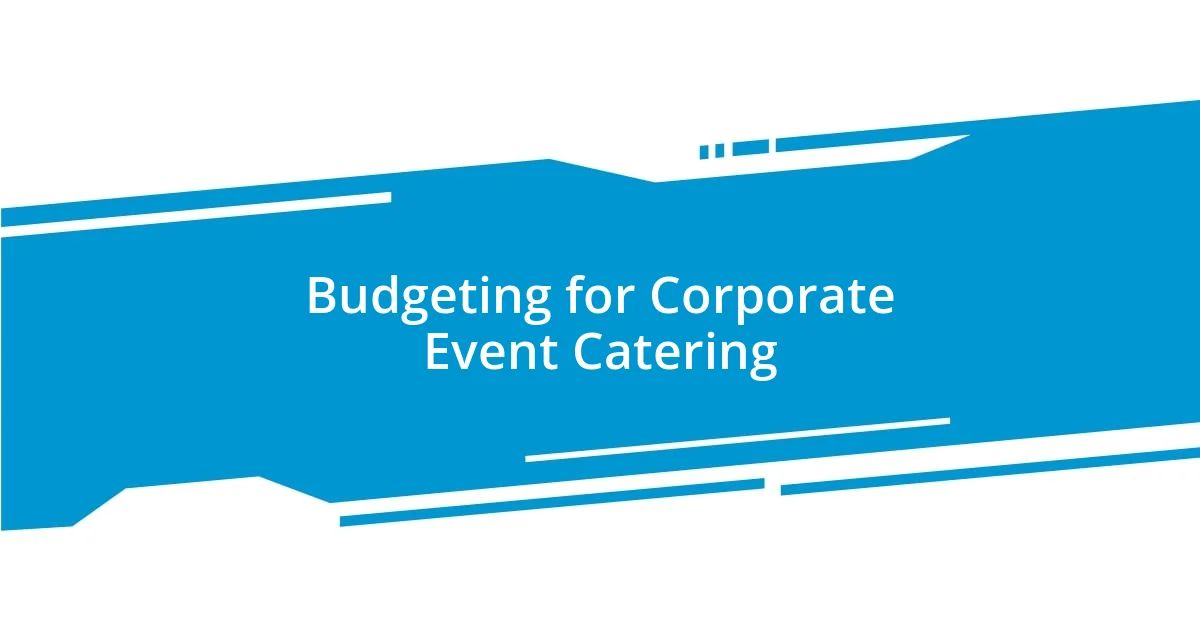
Budgeting for Corporate Event Catering
When budgeting for corporate event catering, it’s crucial to start with a clear idea of your overall event budget. I remember managing a company dinner where we allocated about 40% of our budget to catering. This allowed us to not only choose a fabulous menu but also provided for additional touches like upscale tableware and attentive staff. Have you ever overspent on catering and realized too late that it impacted other aspects of the event? It’s easy to get carried away, so a solid budget helps keep everything in check.
In my experience, transparency from the caterer can make a significant difference in your budgeting process. During one event, our caterer presented an itemized breakdown of costs, including everything from food to service charges. This clarity allowed me to see where we could make adjustments without sacrificing quality. It’s something I highly recommend—don’t hesitate to ask for detailed pricing!
Finally, always factor in hidden costs that can sneak up on you. I once organized an outdoor event where unexpected fees for setup and equipment rental blew our initial catering budget. This taught me to always ask about additional charges beforehand. What if you could be prepared for surprise expenses? By anticipating these potential pitfalls, you can ensure that your catering aligns seamlessly with your overall event goals and avoids any last-minute scrambles.
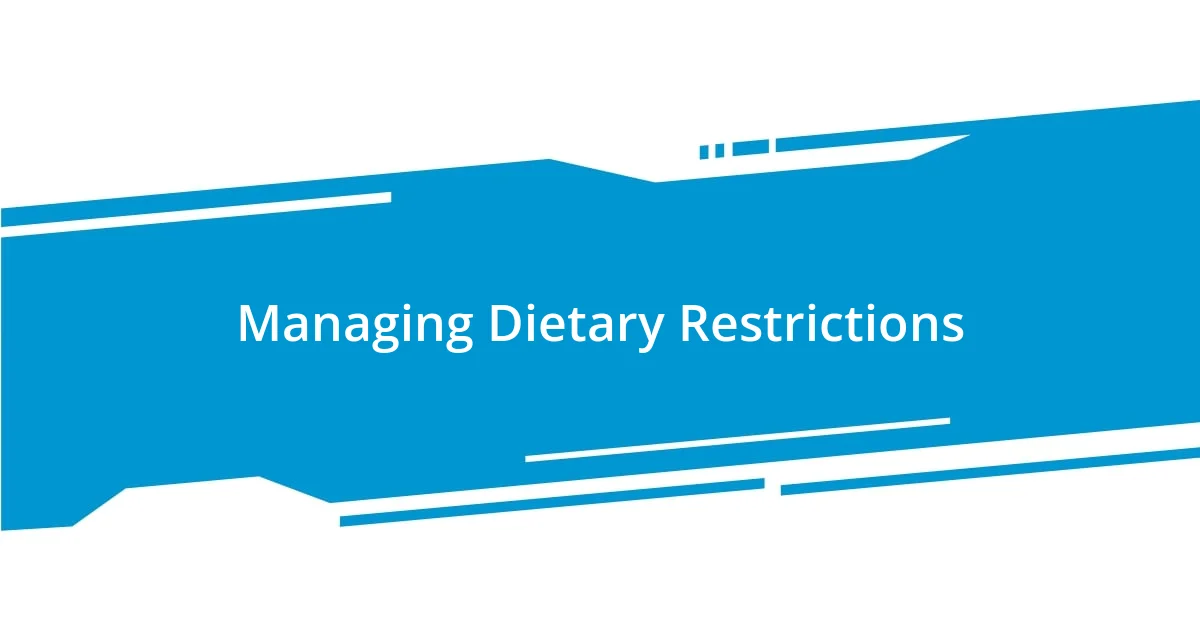
Managing Dietary Restrictions
Managing dietary restrictions is an essential part of corporate event catering. During one particular gala, I had a guest with severe allergies, which prompted me to have a conversation with our caterer about accommodating these needs. I can’t stress enough how vital it is to gather this information in advance. When catering is aware of dietary restrictions beforehand, it reflects a genuine care for the attendees’ well-being and creates a more inclusive atmosphere.
One time, while overseeing a lunch meeting, I noticed a guest eyeing the buffet nervously. After chatting with him, I learned he was vegan and found nothing suitable to eat. It struck me how an oversight like this could dampen someone’s experience. Since then, I’ve made it a point to ensure there are always clearly labeled options for various dietary needs, from gluten-free to vegetarian. It’s so rewarding to see everyone at the table sharing the meal, feeling comfortable and included.
Furthermore, proactively asking for dietary restrictions during the RSVP process can be a game-changer. I once organized a workshop where we included a simple question on the registration form about any food allergies or preferences. This allowed us to plan a menu that catered effortlessly to everyone. Isn’t it amazing how a little foresight can transform an experience from stressful to seamless? By prioritizing these details, we not only avoid awkward situations but also foster a sense of community that enhances the overall event experience.
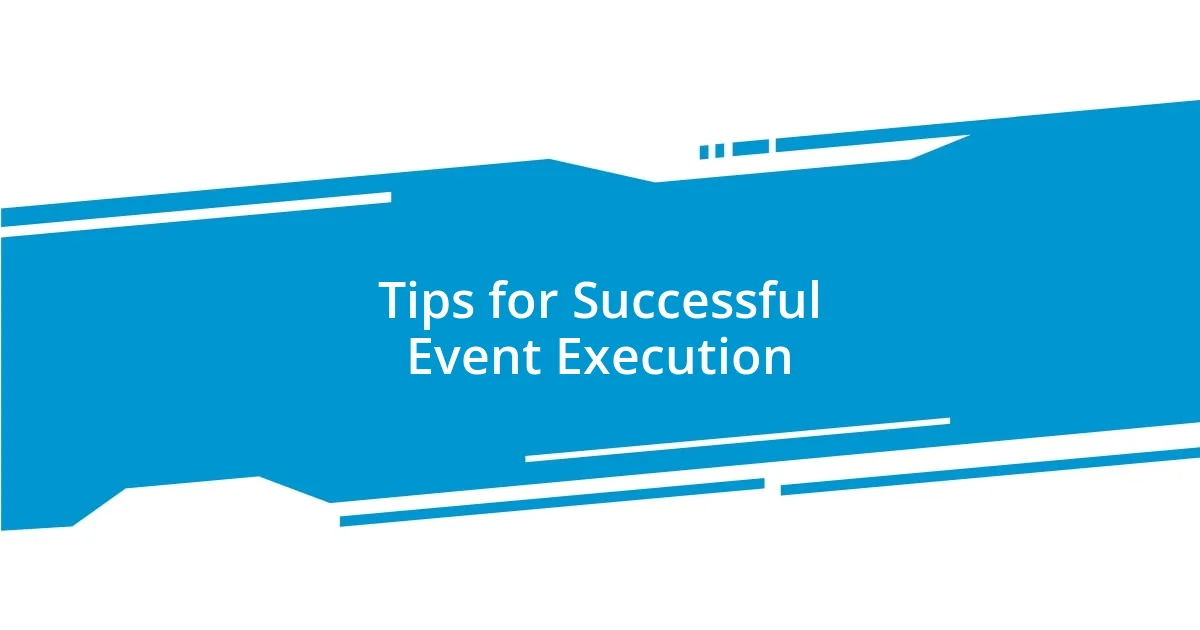
Tips for Successful Event Execution
One crucial tip I’ve learned for successful event execution is to establish clear communication with your catering team right from the start. At one large conference I coordinated, our caterer and I set up regular check-ins to discuss progress, finalize menu choices, and troubleshoot any potential issues. This proactive approach not only kept everyone on the same page but also built a cooperative spirit that made execution day feel like a team effort. Have you ever had a miscommunication that spiraled into chaos? It’s far too common, but with good communication, you can avoid that pitfall.
Another important aspect is having a contingency plan in place. I vividly remember an outdoor event where an unexpected rainstorm hit just hours before the guests arrived. Thankfully, since we discussed backup options beforehand, we quickly shifted the food setup to a covered area, and the caterer had additional staff ready to assist. How reassuring is it to have a Plan B when unexpected challenges arise? It not only alleviates stress but also ensures the show goes on, no matter what.
Lastly, I can’t emphasize enough the significance of a detailed timeline. I once organized a corporate gala that included a variety of food stations, which required careful timing for setup and service to ensure everything flowed smoothly. By breaking down the event into specific timelines for when each dish should be served, and when the waitstaff should be on hand, we created a rhythm that everyone appreciated. Have you noticed how a well-timed event feels so much more polished? That’s the magic of a timeline—it can elevate the guest experience by making everything seamless and enjoyable.
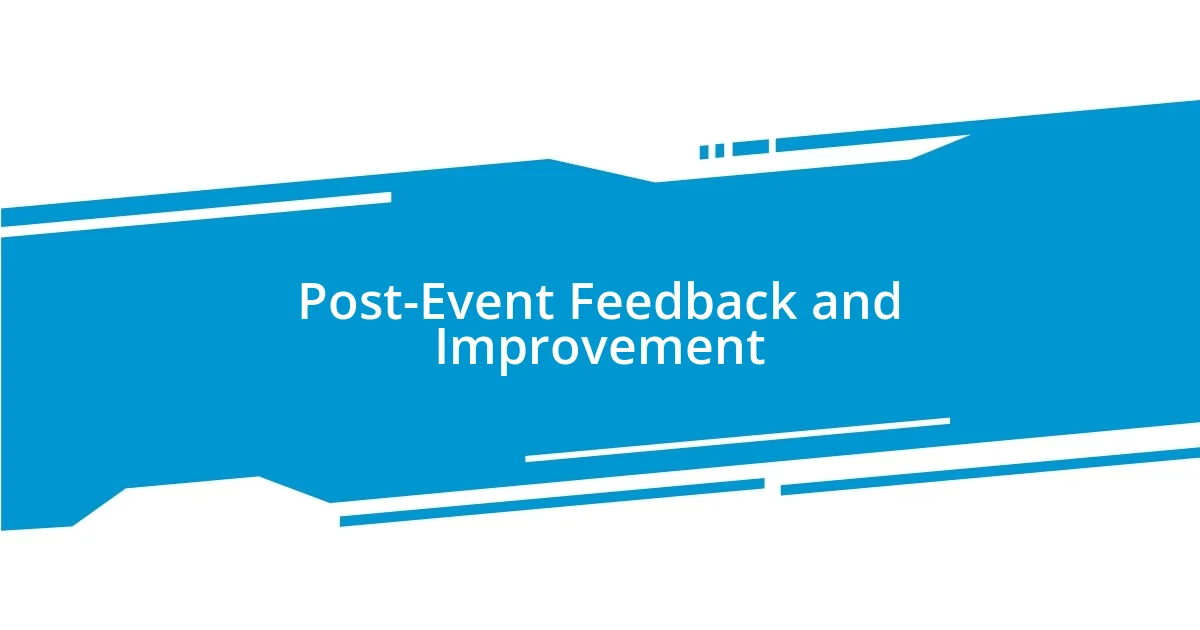
Post-Event Feedback and Improvement
Understanding post-event feedback is crucial for continuous improvement in corporate event catering. After one of my events, I decided to send out a survey to attendees. While the majority loved the food, some expressed concerns about portion sizes. This feedback was eye-opening for me; it made me realize that what feels adequate to one person may not be enough for another. Adjusting portions isn’t just about mathematics; it’s about ensuring every guest leaves satisfied.
I often find it beneficial to hold a debriefing session with my catering team after an event. During one such meeting, we discussed a client’s feedback on the table setup. The guest had a hard time accessing the buffet because of how we arranged the furniture. This insight led us to re-evaluate our space management for future events, teaching me that practical adjustments can significantly enhance the guest experience. Isn’t it fascinating how a simple layout change can make such a difference?
Lastly, I’ve learned that incorporating feedback into the planning stage of future events helps build trust with clients. For instance, I once took suggestions from a post-event survey and implemented them in the next corporate gala. The positive response from attendees not only boosted morale but also strengthened my relationship with the client. Have you ever experienced a moment where feedback transformed your approach? Embracing that feedback loop cultivates a culture of improvement, making every event better than the last.

